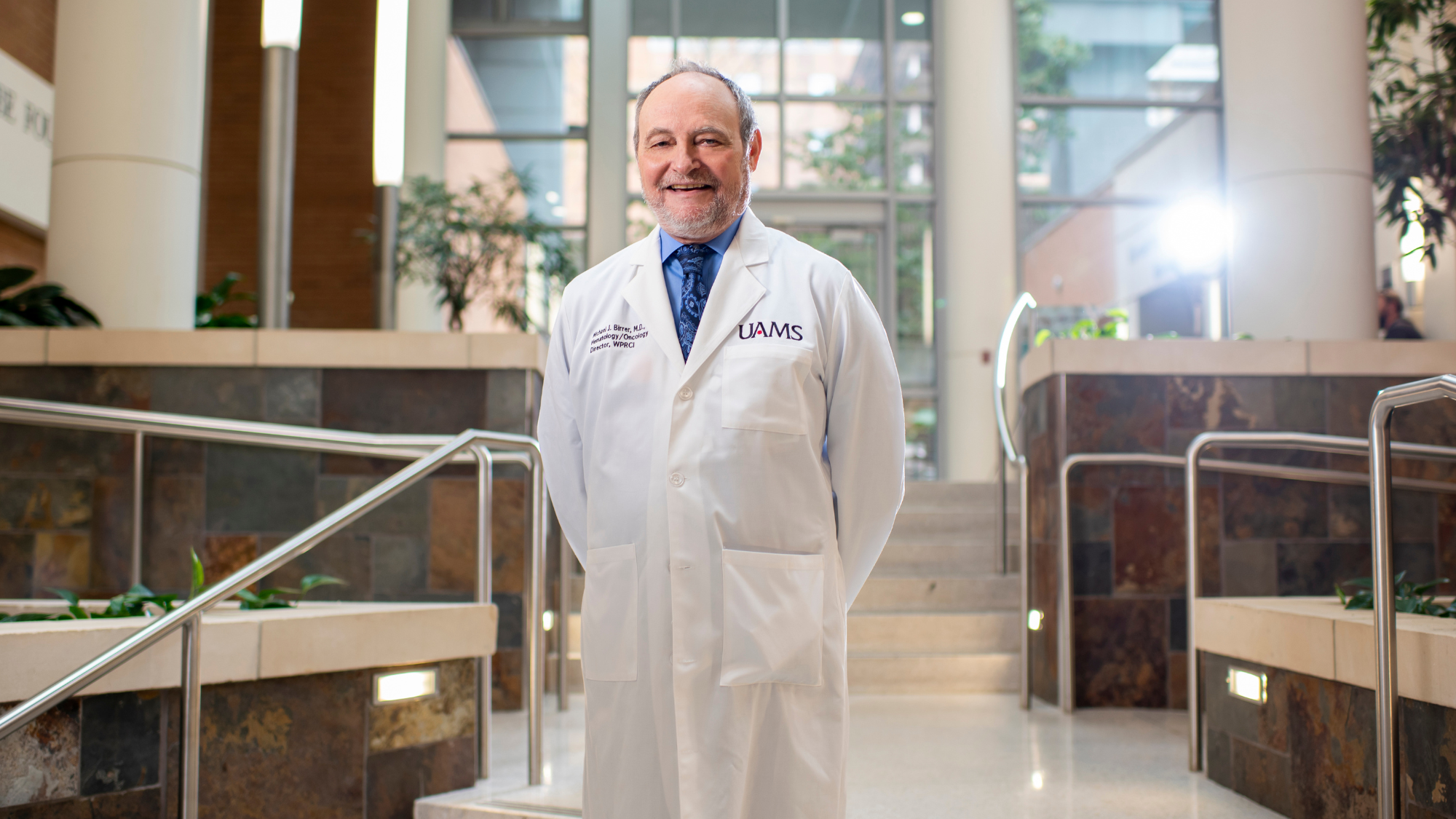View Larger Image

Winthrop P. Rockefeller Cancer Institute Director, Michael Birrer, M.D., Ph.D., led a two-year international clinical trial to test a novel treatment for a deadly form of cervical cancer.
Image by Bryan Clifton
UAMS’ Michael Birrer, M.D., Ph.D., Publishes Study Results in JAMA Oncology on Treatment for Incurable Cervical Cancer
| The results of an international clinical trial led by Michael Birrer, M.D., Ph.D., director of the Winthrop P. Rockefeller Cancer Institute at the University of Arkansas for Medical Sciences (UAMS), on the use of a novel bispecific antibody for women with recurrent or metastatic cervical cancer were published today in JAMA Oncology.
Cervical cancer is a leading cause of cancer and death in women worldwide with approximately 660,000 new cases and 350,000 deaths each year. It is estimated that 13,820 women in the U.S. will be diagnosed with cervical cancer this year, and 4,360 women in the U.S. will die from cervical cancer this year. Arkansas has one of the highest incidence and mortality rates per capita for cervical cancer in the U.S., with 720 cases reported between 2017 and 2021. The overall five-year survival rate for cervical cancer is 67%.
Recognized nationally and internationally as an expert in gynecologic oncology, Birrer led the two-year, multisite study of the bispecific antibody, Bintrafusp alpha, in 146 women with recurrent or metastatic cervical cancer that had progressed during or after receiving platinum-based chemotherapy. The treatment resulted in tumor response in 22% of the patients, with 56% responding to the treatment consistently over a period of six months or more.
“This is the first glimmer of hope we’ve had in a long time for a cancer that is very hard to treat,” said Birrer. “We have desperately needed better treatments, so this is a home run.”
In addition to finding new treatments for patients already diagnosed, another area of focus is prevention with the HPV vaccine. Most cervical cancers are driven by the human papillomavirus (HPV). In Arkansas, only 57% of teens ages 13-17 are fully vaccinated against HPV.
The highest rates of cervical cancer incidence and mortality are in low- and middle-income areas where HPV vaccination is low and the rural nature and socioeconomic status of the community limits access to cervical screening and treatment.
“It’s not a common tumor in the U.S., but it still results in a lot of women’s deaths that should be avoidable,” said Birrer. “There are a disproportionate number of cases here in Arkansas, primarily in rural areas where vaccination rates are low, and women are less likely to get routine gynecological care.”
Only two FDA-approved treatments exist for the treatment of recurring or metastatic cervical cancer, and neither are curative. Current metastatic cervical cancer treatments include chemotherapy, often with poor response rates and an overall survival rate of 10 months.
Patients from cancer centers in the U.S., China, France, Germany, Japan and Korea participated in the study.
Bintrafusp alpha is a laboratory-made bispecific antibody that binds two different cancer-causing antigens simultaneously — transforming growth factor B (TGF-β) and PD-L1, a protein that is highly expressed in a number of cancers. Until now, (TGF-β) has not been targeted in cervical cancer.
“We’ve known about PD-LI for a while, but this study validates that (TGF-β) plays a significant role in promoting late-stage disease progression and is an active target for new agents,” Birrer said.
A former Harvard Medical School professor, Birrer joined UAMS in 2019 after directing the O’Neal Comprehensive Cancer Center at the University of Alabama in Birmingham. A New Jersey native, he completed his medical degree and Doctor of Philosophy degree in 1982 in the Medical Scientist Training Program at the Albert Einstein College of Medicine in New York. He served his internship and residency at Massachusetts General Hospital. He then entered the Medical Oncology Fellowship Program at the National Cancer Institute in Bethesda, Maryland. He was appointed professor of medicine at the Harvard School of Medicine and was director of Gynecologic Medical Oncology at Massachusetts General Hospital and the Gynecologic Oncology Research Program at the Dana-Farber/Harvard Cancer Center.